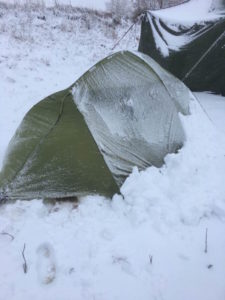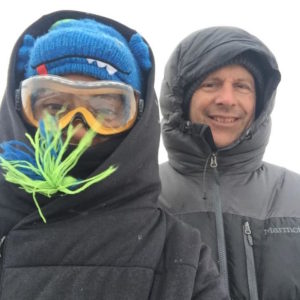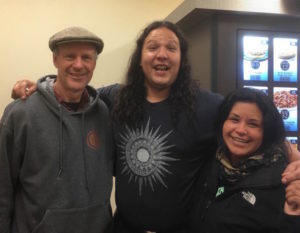
Our tent. And that’s before it got really bad.
Monday, November 28, 2016.
I have a knack for timing: our first night in a tent at Standing Rock coincides with the first snowstorm of the season. It’s a soft, wet, gentle snow. Yet it clings to the walls of our tent, threatening to collapse the fragile structure. Repeatedly during the night, we pound on the tent walls to free them of snow.
There’s little wind, so the sounds of camp nightlife are audible and drift towards us from all directions. The sounds are abundant and loud. They continue late into the night. Singing and drumming. Voices joking and strategizing. Our tent remains warm and dry, but between camp noise and tent-wall snow removal duty, sleep is minimal.
The next morning, the weather goes from bad to worse, with more snow and high winds that lead to blizzard conditions. Lyssa and I opt for breakfast at the casino, which is both satisfying in terms of the price tag, and unsatisfying in terms of nutrition and quality.

Lyssa and Ed braving the blizzard en route to the meeting of elders in the dome.
Manape LaMere, a camp leader and one of the seven elders, invites us to a meeting of camp elders. Lyssa and I lean into the blizzard for the grueling ten-minute walk from our tent site to the dome.
We assemble in a cold, crowded structure heated by a wood stove. The air is filled with a cocktail of smoke from sage, wood and tobacco. With people constantly coming and going, bursts of blizzard air slip in through the dome’s entrance. The interior never warms up much.
The meeting is long, interesting, important. The Elders talk about tribal unity, and the importance of non-native allies remembering that they are guests, and not here to provide leadership. The camp is governed by Native leaders using traditional structures and time-honored procedures. This is likely to be foreign, uncomfortable to non-natives at the camp. It is easy for those of us from a western mindset to slip into a mode of benevolent, well-intentioned colonialism. It is easy for us to want to take over, insist on a “better” way to do things.
It is solid advice. White folk still have this imperial mindset, where are the ones to fix things, the ones who ride to the rescue.
I don’t watch a lot of movies, but as I listen, Dances With Wolves comes to mind, where it takes a white guy, Kevin Costner, to help the Indians figure out how to save themselves (of course, he fails).

Ed, Manape LaMere and Julie LaChappa. Julie partook in the Farmers Defense Camp and civil disobedience in Iowa.
At what point will European-Americans, as individuals and collectively, move beyond the failed notion that we have all the answers? Clearly, we have a ways to go if Congressman Steve King can disparage non-white constituencies as “sub groups,” while making the outrageous statement that historically, all valuable contributions come from whites.
After each of the Elders has spoken, Manape invites me to share with them what’s happening in Iowa in opposition to the pipeline. I am honored to have been given this opportunity, and talk about landowner and farmer resistance, upcoming court hearings, and Jessica Reznicek’s open-ended fast demanding revocation of Dakota Access’ permit.
They appreciate my report and the commitment of their allies in Iowa. But here at Standing Rock, this movement is more than just a fight against the pipeline. It is a movement of historic proportions. It is a movement that is just beginning, a movement involving the cultural revival of traditions, I believe, that will supplant the failed, non-sustainable paradigms that have dominated Western civilization.
I ask Manape what happens after the pipeline fight is over, once we’ve stopped the Black Snake.
“The traditional chiefs who’ve been appointed to lead this camp are looking to build a future that is sustainable and eco-friendly,” says Manape. “We’re a community where people are showing up with wonderful technology, whether it’s heating or cooling systems or just general power usage.”
“And this new form of government we’re building is breathing life into our people, reviving the significance of our treaties,” says Manape. “Some people get it, some people don’t. But what we’re doing is going to save non-Natives as well as Natives.”
